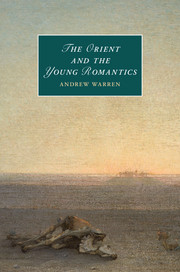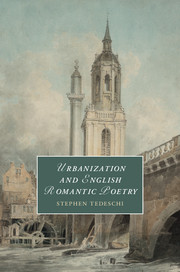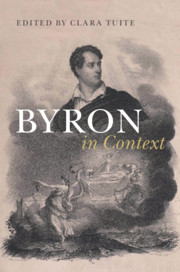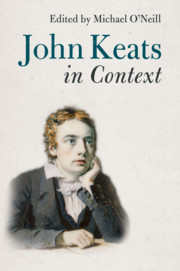The Orient and the Young Romantics
Part of Cambridge Studies in Romanticism
- Author: Andrew Warren, Harvard University, Massachusetts
- Date Published: November 2014
- availability: Available
- format: Hardback
- isbn: 9781107071902
Hardback
Other available formats:
Paperback, eBook
Looking for an inspection copy?
This title is not currently available for inspection. However, if you are interested in the title for your course we can consider offering an inspection copy. To register your interest please contact [email protected] providing details of the course you are teaching.
-
Through close readings of major poems, this book examines why the second-generation Romantic poets - Byron, Shelley, and Keats - stage so much of their poetry in Eastern or Orientalized settings. It argues that they do so not only to interrogate their own imaginations, but also as a way of criticizing Europe's growing imperialism. For them the Orient is a projection of Europe's own fears and desires. It is therefore a charged setting in which to explore and contest the limits of the age's aesthetics, politics and culture. Being nearly always self-conscious and ironic, the poets' treatment of the Orient becomes itself a twinned criticism of 'Romantic' egotism and the Orientalism practised by earlier generations. The book goes further to claim that poems like Shelley's Revolt of Islam, Byron's 'Eastern' Tales, or even Keats's Lamia anticipate key issues at stake in postcolonial studies more generally.
Read more- Shows how Romantic poetry anticipates many of the themes and ideas of modern postcolonialism
- Puts forward new readings of poems by Byron, Shelley, Keats, Southey and Wordsworth
- Reads Romantic poems about the East via philosophy, political philosophy and critical theory
Reviews & endorsements
'… this book is a compelling critical achievement in part because it is finely wrought, but also because in it Andrew Warren raises questions about the poetry of the second generation that are very much worth raising and discussing … Warren's study offers us real insight and sustained critical pleasures.' Theresa M. Kelley, Studies in Romanticism
Customer reviews
Not yet reviewed
Be the first to review
Review was not posted due to profanity
×Product details
- Date Published: November 2014
- format: Hardback
- isbn: 9781107071902
- length: 286 pages
- dimensions: 235 x 158 x 22 mm
- weight: 0.56kg
- availability: Available
Table of Contents
Introduction: from solipsism to Orientalism
1. 'The Book of Fate' and 'The Vice of the East': Robert Southey's Thalaba the Destroyer (1801) and High Romantic Orientalism
Interchapter I. Montesquieu: nature and the Oriental despot
2. Byron's Lament: Lara (1814) and the specter of Orientalism
3. The spirit of Oriental solitude: Shelley's Alastor (1816) and Epipsychidion (1821)
Interchapter II. Rousseau's foreigners
4. 'The Great Sandy Desert of Politics': the Orient and solitude in The Revolt of Islam (1818)
5. 'Unperplexing Bliss': the Orient in Keats's Poetics
Bibliography.
Sorry, this resource is locked
Please register or sign in to request access. If you are having problems accessing these resources please email [email protected]
Register Sign in» Proceed
You are now leaving the Cambridge University Press website. Your eBook purchase and download will be completed by our partner www.ebooks.com. Please see the permission section of the www.ebooks.com catalogue page for details of the print & copy limits on our eBooks.
Continue ×Are you sure you want to delete your account?
This cannot be undone.
Thank you for your feedback which will help us improve our service.
If you requested a response, we will make sure to get back to you shortly.
×





